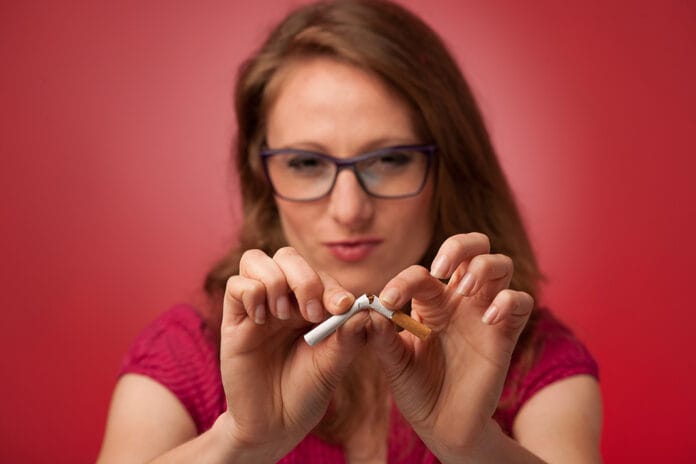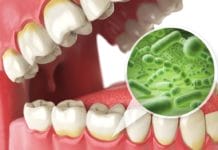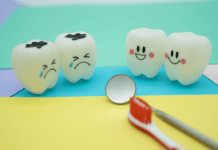“Smoking or non-smoking?” the server asks. Although my dad has a pack of Marlboro Reds in the pocket of his overalls, he opts for the nonsmoking section (like it much matters since cigarette smoke doesn’t understand invisible boundaries). It’s the 1990s. I am a child, and everywhere I look, I see the strength and influence of the tobacco industry. I probably even have candy cigarettes in my pocket.
Television tells me that the most masculine and badass men smoke. The most beautiful and successful of women (yes, even Rachel on Friends) smoke. My favorite line in Jurassic Park? “Hold on to your butts,” Samuel L. Jackson’s character mutters with a smoldering cig flicking in the corner of his mouth.
We talk in school all the time about the dangers of smoking, but I see my parents, grandparents, and my friends’ parents smoking. So I figure it can’t be that awful. It isn’t for kids, but grownups can do it. Kind of like cursing and watching R-rated movies, right?
Fast forward, and it’s the first decade of the 2000s. I am a rebellious teenager. I hide Camels everywhere – under the bridge, under my bed, in my purse, or even in my car door where the chrome is missing. My friends, who are already 18, purchase them for me. I don’t smoke often, maybe one a day if I can sneak them past my teachers or Mom. Sometimes, when my boyfriend and I hang out, we park with a good view and smoke them together. It makes us feel cool.
Fast forward again to college. I still smoke, but I go through phases where I smoke them for a few months and then don’t smoke for a few months. It’s more of a social habit, hanging out in front of the dorm building, sitting atop the picnic tables, and wasting time with friends. Addiction hasn’t gripped me yet.
Addiction finally ensnares me when I turn 21. I started going out to the bars and soon realized that smoking at the bars was more fun than smoking in front of a dorm building. At this time, my life is stressful and confusing, and I feel lost. I start smoking even when I’m not socializing. I don’t realize that I’m self-medicating. I slip and slide faster. Before I know it, I am a smoker.
I will smoke for six more years. Every day, from the moment I wake up and sip my first cup of coffee to right before I brush my teeth to go to bed. It will affect my blood pressure, my social groups, my lungs, my circulatory system, and my self-worth. I will stand outside in blizzards, huddled on the porch in my snowboarding coat with a beanie on my head because now I am a slave to my addiction. Now I hate myself, but I’m afraid to quit. I’m trapped.
That’s how addiction feels. Like you’re trapped.
When I got into dental hygiene school, I knew I had to kick the habit, and hallelujah, I did! It has been many years now since I quit (almost as many as I spent as a smoker), and I truly can’t imagine being a smoker now. In fact, now I just find it bizarre that I was a smoker for so many years because it doesn’t even seem to fit my personality or lifestyle.
As a dental hygienist, my own struggles with addiction have given me a galaxy-sized portion of sympathy. When patients tell me they’re trying to quit but are struggling, I can say, “I know it’s tough,” and mean it. I completely understand what they experience.
Many times, I tried to quit cold turkey and failed. I tried nicotine gum. I don’t know if you’ve ever chewed nicotine gum, but it’s truly foul, and the nicotine swallowed in my saliva felt rotten in my gut. I tried chewing Camel Snus pouches with the same results. I even considered medications to assist with quitting, though I never pursued that course.
Finally, I tried something that stuck. It was simple. I don’t remember how I came to this, if a friend or colleague suggested it, or if it was my own brainchild. Here’s what I did. I quit smoking my cigarettes in my car – just that one little change. It was tough at first, and then it became easy. I started to like that I was caring more for my car and that it didn’t smell like smoke anymore. Pretty soon, I could hop right in my car and not think of smoking until I got to my destination.
Then I stopped taking my cigarettes to work. At the time, I was waiting tables at a restaurant part-time (a primo gig for a dental hygiene student). I thought to myself, “If I can go five or six hours without having a cigarette, that will be pretty good. That doesn’t sound too difficult.” I cut out my shift cigarettes. It was surprisingly easy, and it helped that none of my coworkers smoked my preferred Camel Crush.
I started to feel proud. These changes might not seem like a big deal to you if you’ve never had a habit to break. But if you have, you understand what a morale booster it is!
Eventually, I worked my way down to only one cigarette per day. The last one to cut out was my end-of-the-day “treat.” It was my reward for making it all damn day. It was my evening unwind, and I frigging loved it.
This one was killing me – this one I didn’t want to give up. I wondered if allowing that one cigarette a day even made me an addict. Maybe one a day wasn’t that bad?
Ha. What a joke.
I’ll admit that I was scared to give up my last cigarette. In many ways, I didn’t want to. While talking with my nurse practitioner, she asked how quitting was going. I announced to her, “I’d like to switch from Paxil to Wellbutrin.”
“You’ve been doing so well on the Paxil. Why do you want to switch?” she asked.
“I’ve heard it helps smokers quit,” I said.
When she asked how many cigarettes I was down to per day, she laughed. This was when she gave me life-changing wisdom. She said, “One a day is a habit. It’s a choice. It’s not an addiction.”
Mind blown. It was so simple. She was right. With those words firmly implanted in my mind, I quit that last cigarette. I made the choice and set myself free.
Fast forward to the present. I am a dental hygienist in Butte, Montana, and have been tobacco-free for four years. I can hardly stand the smell of cigarettes, and I no longer crave them. In fact, the very idea of smoking a cigarette is gag-worthy.
Life is good.
Paying Advice Forward
At the start of the summer, one of my perio maintenance patients shared with me that he had cut his chewing habit down to one tobacco pouch a day. My turn to share the wisdom. “At this point, one a day is more of a habit than an addiction, you know.” He laughed because he knew it was true, and I laughed too because it sounds so simple when spoken aloud.
I shared with him that this wisdom was borrowed from my nurse practitioner when I was trying to quit. I told him that her words delivered the kick-in-the-rear that I needed to finally be done with the cigarettes.
At his next four-month recall, my patient proudly shared with me that he had quit. Yes, I am taking just a tiny pinch of the credit, just as I give a pinch of my own success to my nurse practitioner.
Support Patients as They Quit
As health care providers, I believe it’s important not to shame our patients and avoid being pushy about quitting. Patients can only and will only quit when they are ready and willing. Just let them know that you are there to support them. And trust me, they don’t want to hear any lines about quitting.
The most helpful advice I can give to my patients comes from my own experiences. If you have not had your own tango with addiction, you may not have the best arsenal of tips and tricks in your op. If I were to pass on my advice as a clinician, I would say something like:
“You can quit one cigarette or one dip at a time. Just cut out one dip or cigarette a day until it becomes comfortable and easy, then cut out the next. Start with what you feel is the least important smoke or dip of the day, then work your way to the next. You can even start by saying, ‘I will no longer take my cigarettes with me when I run errands,’ or ‘I will not chew after dinner,’ and work forward from there.
Be patient with yourself. It takes time and routine to establish a habit, and it will take time and routine to break a habit. It might take a few months, it might take a year, maybe it’ll take multiple years. That is okay. Progress is progress, and it is worthwhile to quit effectively rather than cheat yourself by trying to rush or cut corners. Along the way, celebrate and be proud of each accomplishment. Slow and steady wins the race very much applies to quitting.”
As your fellow dental hygienist, I also would like to remind you that no human sets out with the goal of becoming an addict. Often an addict is a victim of circumstance. They might have a rough home life or a high-stress job, or maybe they have a mental disorder that makes happiness difficult to experience. They might have grown up in a culture where smoking or chewing is or was “the norm.” Maybe it’s a mixing bowl of ingredients that has led to their addiction.
Please be kind. Addicts are aware that their addiction is unhealthy, and they know it’s controlling their lives. They would spend their last $10 bill for a pack of smokes. So they already feel crappy enough without someone shaming them.
Be encouraging. Be positive. Make your operatory a judgment-free space. When your patient is ready to quit, they will let you know. Then support them however they need. Sometimes just knowing someone is excited about your progress is all the motivation it takes. Maybe a moment of honesty will change their lives.
Before you leave, check out the Today’s RDH self-study CE courses. All courses are peer-reviewed and non-sponsored to focus solely on high-quality education. Click here now.
















